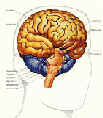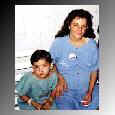
MEDICATION AND AUTISM

Although we do not yet know the causes of autism, medicine has made important strides in treating some of its symptoms. Medications can sometimes be very helpful in reducing or eliminating problem behaviors. Because medications may also produce harmful side effects, though, it is essential to weight their risks against their benefits. In addition, you should be aware that some treatments are still new or experimental and carefully consider any controversy surrounding them in discussions with your doctor. In this section we will review some medications most commonly prescribed for children with autism and the important considerations involved in selecting and using them.
![]()
The medications used to treat children with autism, like all medications, have their benefits as well as their limitations. No medication has been developed to "cure" autism, rather they are sometimes used to treat specific symptoms when these interfere with education or pose a potential danger. For example, medication may be prescribed to treat self-injurious behavior.
The medications most often prescribed to treat autism are called neuroleptics, or "major" tranquilizers, and include a number of medications which affect the brain in specific ways. Among the most commonly used major tranquilizers are thioridazine (Mellaril), chlorpromazine (Thorazine), haloperidol (Haldol) and risperidol (Risperdal).

Do not confuse these major tranquilizers with the "minor" tranquilizers such as Valium and Librium, which adults commonly take to manage anxiety. The "major" tranquilizers act in a different way, and are most frequents used for adults with severe psychiatric illnesses as well as some children with autism. One of the ways they work is by reducing the activity of dopamine, a chemical in the brain that acts as a neurotransmitter, or messenger, between nerve cells. In children with autism, dopamine appears to regulate certain problem behaviors-for example, self injury and stereotyped, or purposeless, repetitive movements. By decreasing these behaviors, major tranquilizers may increase the attention span of children with autism and thus make them more able to learn.

Because each medication has a range of side effects, it is important to balance the potential benefit of the medication against its risks and to be prepared for any side effects you may observe. Whenever medication is prescribed, your child's doctor should review the possible benefits, risks and side effects with you, other people who help care for your child and the school staff.
Probably the most common side effect of the major tranquilizers is sedation or sleepiness. A child may become overly sedated after the medication is used and may be unable to benefit from his/her programs. Other side effects include problems in movement. Sometimes children will develop peculiar postures or muscle spasms or stiffness around the head and neck; these side effects can often be controlled by the addition of another type of medication. To some extent, all major tranquilizers produce dry mouth, constipation, blurred vision, and other effects most commonly associated with allergy medications or over-the-counter cold preparations.
Less common side effects include changes in the function of the liver, effects on blood cells, restlessness or agitation, sensitivity of the skin to the sun, and true allergic reactions.
Sometimes after a major tranquilizer has been stopped or administered for a long period of time, other side effects may emerge. For example, a child may develop unusual head and body movements, which usually disappear some weeks or months after the drug is stopped. The most worrisome side effect of these drugs is a condition know as tardive dyskinesia. Tardive Dyskinesia usually occurs only after very long periods of treatment. In tardive dyskinesia, movements of the face-grimaces or tongue protrusion-are accompanied by unusual movements of the body and hands. Probably these movement problems reflect changes in brain sensitivity to neurotransmitters, the brain chemicals affected by the drugs. Because this condition is sometimes irreversible, it is important that the doctor prescribing the medications continue to see your child periodically to monitor the medication.
A fairly new medication, Risperidone (Risperdal), is called an "atypical" major tranquilizer. It seems to be much more selective in terms of its action in the brain. In general, its side effects seem to be much less than those of other major tranquilizers. Research on this, and related medications do not have the same potential for causing long-term side effects, particularly tardive dyskinesia. The major problem with Risperidone is weight gain, which can sometimes be significant even on very low doses of this medication.
Given the potential side effects of these medications it is important that they be used only when necessary. Before starting your child on medications for behavior problems, you may want to try some other alternatives including behavior management or a change in diet.
The use of these medications should not be undertaken lightly. Often, though, they can greatly help your child adjust and respond well to an educational program. A good working relationship between you, your child's physician, therapists and school staff will help to ensure that your child is treated for the shortest period of time with the lowest possible dose of medication.
There are other drugs available for ASD kids, but their usefulness has not been proven as conclusively. In addition, the response of these children to other types of medications is less predictable than their response to major tranquilizers or in comparison to typically developing kids. For example, stimulant medications are sometimes used for children with attention span problems and "hyperactivity", but when these same medications are prescribed for children with autism with similar behaviors, their behavioral problems often become worse.
Another set of medications has recently been used with children with autism and related disorders. These medications, called selective serotonin re-uptake inhibitors (SSRI), include fluoxetine (Prozac), fluvoxamine (Anafranil), and clomipramine (Luvox). They are prescribed because ASD kids have long been known to have high levels of the neurotransmitter serotonin in their systems. Serotonin re-uptake inhibitors work for children and adults with depression and with Obsessive Compulsive Disorder (OCD). One of the most common side effects is called "activation"; when a child becomes easily agitated or upset.
Several other medications have been utilized for the treatment of autism. These include fenfluoramine, naltrexone, other antidepressants and Lithium. In general, the evidence supporting the use of these medications in large groups of autistics is quite limited.
(References: Michael D. Powers, Psy.D. "Children with Autism")

|
Patient Centers: Medications for Pervasive Developmental Disorders |
|
|
Evaluating the Effects of Medications by Temple Grandin |
|
|
Autism Society of America - Medications Package (in PDF) |
|
|
Ritalin Information: Side Effects, Cautions, Alternatives, ADD, ADHD |
|
Do you have difficulty getting your child to take medications? Have you contacted a compounding pharmacy?
Altavista search on compounding pharmacies
Getting a child to take his or her medicine is, at times, easier said than done. Prescription compounding offers a number of approaches that often will solve this problem.
Flavoring a drug to suite a child's taste is an obvious choice as is changing the form of a medication from that of a pill or a capsule to a liquid. Another approach is to compound the drug into a sustained-release format, thus reducing the number of pills to be taken or, as seen in the following case study, combining several drugs into a single dose.
14: November 21, 2001